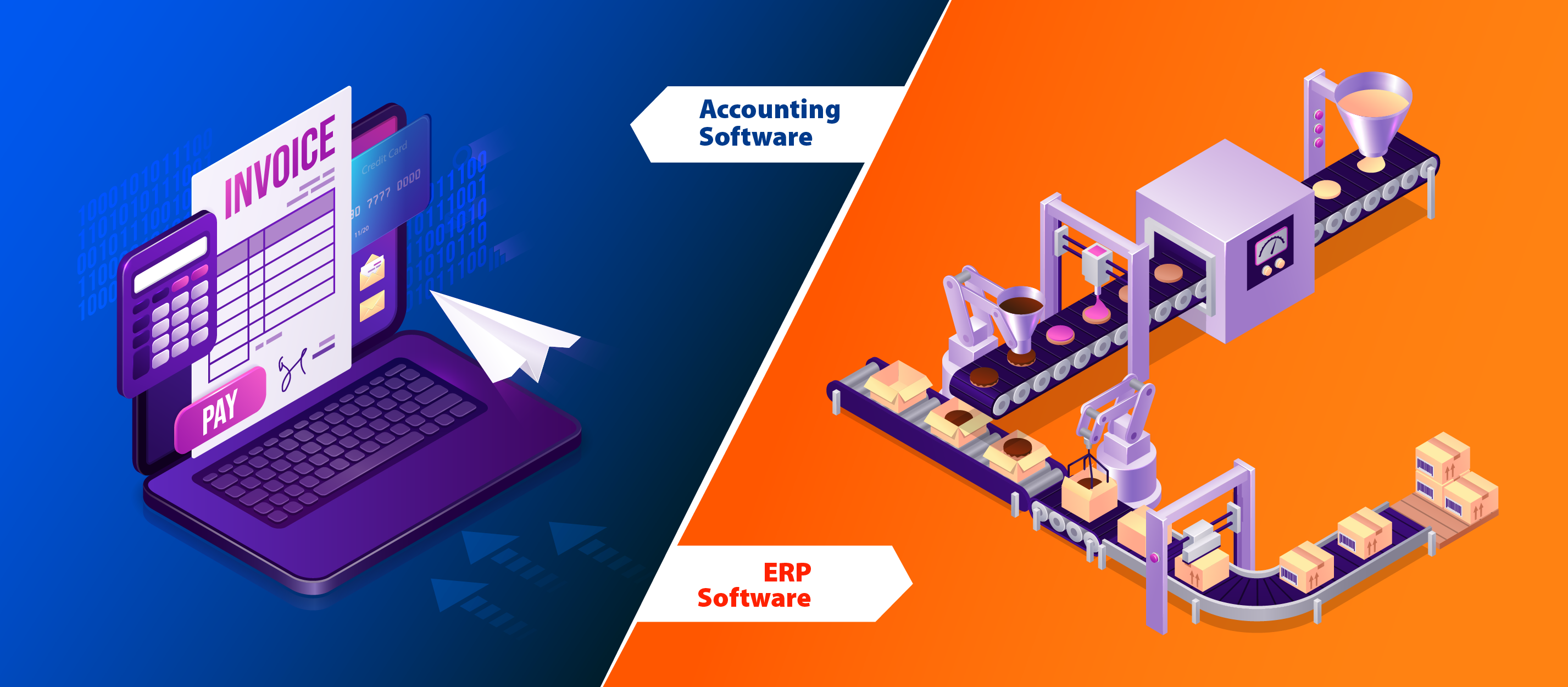
The most important and tricky part of dealing with the choice of having an ERP system is to decide which ERP strategy would be the most fruitful and advantageous to your enterprise.
And the choice is not at all simple and obvious. Businesses differ in many ways, such as their size, products, services, and requirements.
Thus, choosing an ERP system that best fits to the different criteria and gets seamlessly integrated with your business processes is the key.
And that could either be an on-premises ERP, or a Cloud-based ERP, or may be in some cases a combination of both.
So, before choosing primarily between the two, let’s frame a clearer picture on Cloud & on-premises ERP systems and how they work.
Cloud-based ERP System
Provided as a service and hosted on vendor’s servers, Cloud ERP allows the software accessibility to the user over the internet.
The software and its data is managed centrally at a remote datacenter (Internet “cloud”) by the ERP vendor and accessed by customers through a web browser.
As against the on-premises ERP set-up, a Cloud-based software doesn’t need an extra software and hardware system to get installed.
Hence, it reduces the overall operational cost of the enterprise. Moreover, the user has to pay for the used resources on a monthly basis, which reduces the upfront costing.
Adding to the list of benefits of Cloud ERP, it brings with it anytime, anywhere availability due to its mobility, as it can be accessed from anywhere through any internet-enabled device.
It also allows increasing the number of licenses whenever required, has backup systems and recovery plans running 24×7 for uninterrupted services, automatic upgrades, maximum uptime assurance, etc.
Furthermore, with Cloud ERP, the firms also have the benefit of secured data with back-up since it is not stored on their servers locally.
Owing to these fruitful gains, most of the industries have of late switched from on-premises to Cloud-based ERP solutions.
The Downside of Cloud ERP
We discussed above what Cloud ERP is, and how beneficial it is for your business. But other than these advantages, there are certain challenges too which the Cloud ERP users face.
To begin with, the admin or owner of the enterprise loses control over the management of the system, as the vendor takes most of the responsibilities.
Also in case of business expansion, enterprises need to purchase more ERP licenses and resources from vendors, which becomes a huge amount to pay on a monthly basis, sometimes even surpassing the cost of on-premise ERP, and hence Cloud for large enterprises is a less viable option.
Who can use a Cloud-based ERP?
As mentioned earlier, you must consider your industry type and the environment you are operating your business in while choosing an ERP system.
Keeping this in mind, mostly the small and mid-sized businesses use Cloud ERP systems due to their low upfront and operational costs.
Since the e-commerce companies have their business displayed on the internet, it is obvious for them to integrate with a Cloud-based ERP.
Similar to that, manufacturing startups or small-businesses that have strict budgets.
Moreover, it even provides flexibility to access their systems and information from anywhere in the world, hence Cloud ERP proves to be the best option for them.
Now, we’ll throw some light on the on-premises ERP systems- how they operate, their pros & cons, and cost.
On-Premises ERP
A traditional ERP software, or on-premises ERP refers to the ERP system that company decides to host and maintain in-house physically, instead of using the internet for data storage and maintenance.
It has a database that resides on an onsite server and hardware. It involves heavy investment and is managed by the IT staff of the company which has implemented it.
In this scenario of growing startups, where most of the companies are looking to have a Cloud-based solution, there are many enterprises that still rely on the on-premises ERP systems.
One of the major benefits of an on-premises ERP is the owner having greater control over the operations of the enterprise.
Also an on-premises solution is generally more customizable, which means organizations can make changes to the solution so that it fits in with their company policies and processes.
Also, on-premises ERP systems ensure the enhanced safety of the vital stats and information of your business resources.
In the case of Cloud-based systems, cost increases for new subscriptions and licenses, whereas for on-premises ERP, the upfront cost is high, but the total cost of ownership is low.
The Downside of On-Premises ERP
Installation of on-premises ERP carries its major drawbacks, as you need a hardware device, server and also a dedicated IT team for its maintenance.
This sounds an expensive deal as compared to the Cloud based ERP systems. Mobility and anywhere, anytime accessibility are yet another important issues that on-premises ERP users face, as information and data on the on-premises systems cannot be accessed and operated from anywhere.
On-premises ERP users
It is clear that on-premises is an expensive deal and is surely unaffordable for start-ups and small-sized enterprises.
Large companies and established businesses mostly prefer the on-premises ERP systems, since they have a humungous amount of data that is easier to manage in-house instead of opting for cloud storage.
Having said that, the trend is gradually changing with the businesses opting for a solution that serves their holistic needs.
Closing thoughts
In recent years, the demand for Cloud-based services has shown strong and consistent growth. But the on-premises ERP systems are still pretty much in demand, and have held their ground firmly.
Businesses opt for either of the solutions based on their requirements and strategies. Furthermore, some businesses even choose to have the best of both worlds by having a mix of on-premises and Cloud-based solutions, thus creating a hybrid environment.
In a nutshell, choosing between the Cloud and on-premises is not always an obvious choice.
The choice becomes clear only when you know what your business requirements are, what your strategy is, and which solution fits the best within your business ecosystem.
Thus, it is most important to understand the circumstances and demands of the enterprise while choosing the ERP solution.
In case you are looking to make the ERP choice for your business, we at BatchMaster can help you. Reach out to us today at sales@batchmaster.com for a free consultation.



















